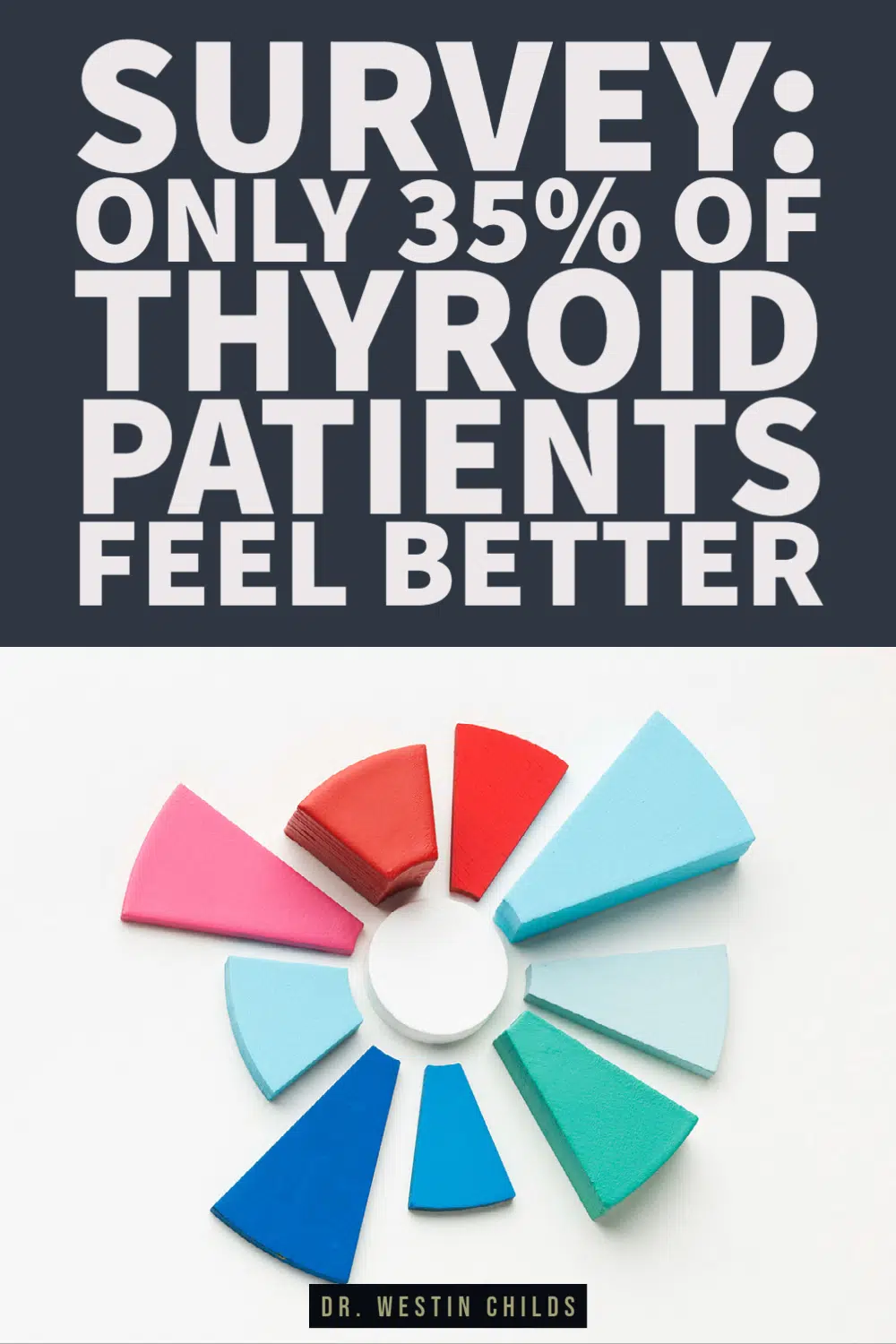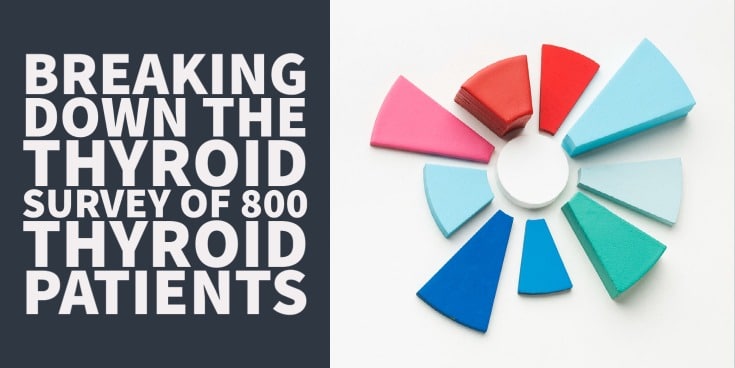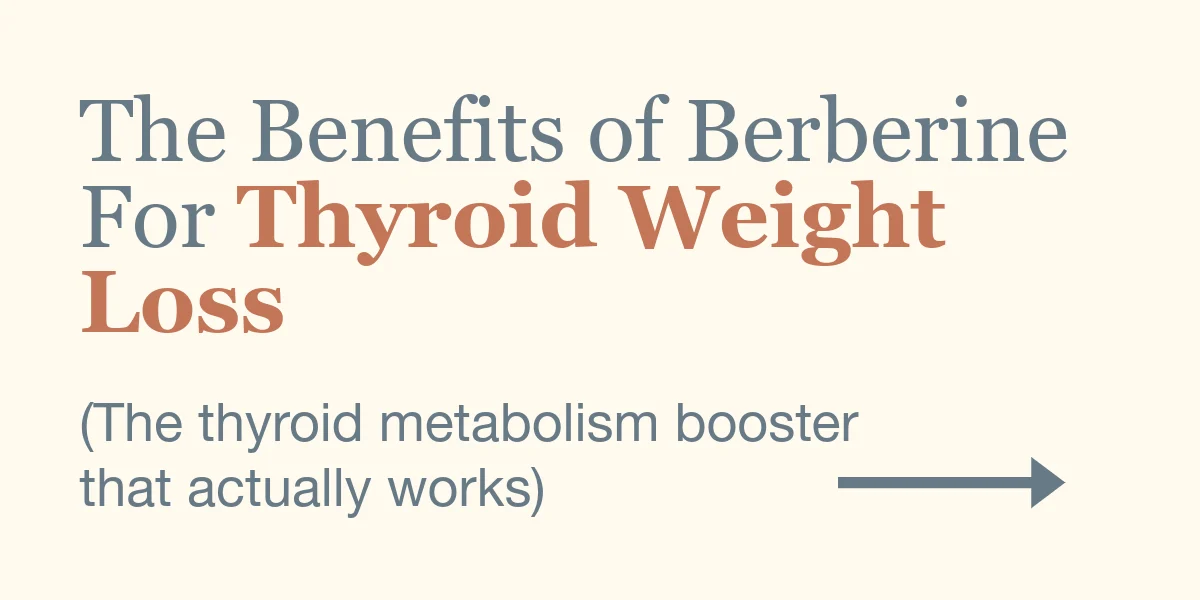Up to 5-10% of the population (depending on how you define it) suffers from a chronic condition known as hypothyroidism.
This wouldn’t be a problem, except we have anecdotal, and now survey data, which suggests that there is a big problem with how these patients are being treated.
This article will walk you through the most recent survey produced by Verywell health and provide my opinion as to why we see a failure in the treatment of these thyroid patients.
What is the Verywell Health Thyroid Survey?
The Verywell health thyroid survey was is a survey of 840 thyroid patients which really highlights how doctors have been failing thyroid patients.
I’m not here to bash those doctors but I am here to help you understand why it is that so many thyroid patients continue to suffer from persistent symptoms despite being treated ‘adequately’.
I’ve found while reading over 19,000 comments on this blog, that many thyroid patients are often confused and feel that they are alone in their struggles.
The entire purpose of my site is to help inform thyroid patients about what I refer to as proper thyroid management.
And the purpose of my review of this survey is to explain why it is that so many thyroid patients continue to suffer (it will become apparent as we continue).
You can view the entire survey at any time directly at this link here (1).
So, back on track, what exactly is this survey and why was it done?
As you’ve probably already experienced, there is a big divide between thyroid patients and doctors who treat thyroid patients.
Many thyroid patients are experiencing symptoms of hypothyroidism despite undergoing ‘proper’ treatment and their doctors continue to insist that these symptoms are not related to their thyroid disease.
This has been going on for decades, and I’m one of many sites which attempt to explain why this gap exists.
This survey was designed to act as a voice for thyroid patients.
While this survey is incredibly helpful, it’s important to note that surveys are not scientific studies. So, while this information is incredibly helpful, it doesn’t necessarily prove anything.
But, if you are a physician reading this survey and if you are treating thyroid patients then hopefully it opens up your eyes to what thyroid patients have been experiencing.
What did this survey show?
I’ve included a list of the key findings below but I also want to highlight some of what I consider to be the most important findings:
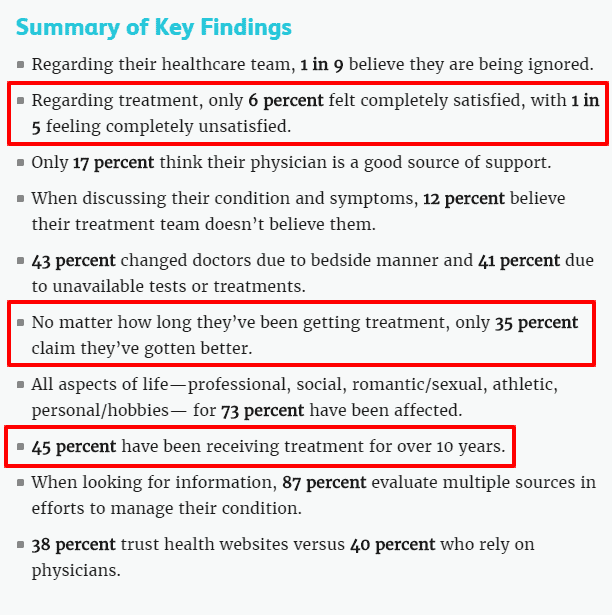
#1. Regarding thyroid treatment with thyroid medication, only 6 percent of people felt completely satisfied with only 1 in 5 people (or 20%) feeling completely unsatisfied with their treatment.
This is a massive percentage of people who are unhappy with how their treatment is going.
6% means that roughly 1 out of every 20 thyroid patients actually feel good about the treatment they are receiving!
On the flip side, roughly 20% of people feel like their therapy is not working at all or helping to improve their symptoms.
#2. No matter how many years they have been getting treatment, only 35% of thyroid patients claim that they have gotten better.
I’ve argued that hypothyroidism should not be looked at as a chronic disease, meaning a disease that must plague you with symptoms for the rest of your life, but looking at this number suggests that approximately 65% of people taking thyroid treatment still feel poorly.
#3. 45% of people in this survey have been receiving thyroid treatment for over 10 years.
This is particularly concerning, especially as a patient, because it indicates that the landscape of thyroid management has not changed recently and it doesn’t look like it’s going to change in the near future.
And that is exactly why we are having this discussion, to try and push forward a change in treatment paradigm designed to help thyroid patients actually feel better.
With that in mind, let’s break down some of the other aspects of this survey to get some more information.
DOWNLOAD FREE RESOURCES
Foods to Avoid if you Have Thyroid Problems:
I’ve found that these 10 foods cause the most problems for thyroid patients. Learn which foods you should avoid if you have thyroid disease of any type.
The Complete List of Thyroid Lab tests:
The list includes optimal ranges, normal ranges, and the complete list of tests you need to diagnose and manage thyroid disease correctly!
Patients are Not Being Treated Appropriately
I think that one of the main things that this survey suggests is that thyroid patients are simply not being treated appropriately.
If you’ve been a thyroid patient for any length of time then you probably know that the treatment paradigm which all physicians operate under is one that focuses primarily on the TSH as a marker of assessing thyroid function and T4-only thyroid medication (such as Synthroid or levothyroxine) to treat hypothyroidism.
The combination of the TSH and Synthroid are basically the only two things that endocrinologists and family practice doctors focus on.
I’ve argued, and continue to do so, that this approach doesn’t allow for personalized care, the consideration of individual genetics or preferences, and leads to overall worse outcomes.
But, let’s put that aside and assume for a second that the TSH and Synthroid were enough to treat the thyroid appropriately.
What would we expect to see in regard to patients and how they are feeling?
Well, hopefully, we would see that their symptoms have completely resolved as their TSH normalized or, in other words, came into the normal range.
But is that what we see?
Not at all.
According to the survey of over 800 people, we see that a staggering 70-80% of thyroid patients continue to suffer from MANY of the symptoms of hypothyroidism despite being treated.
And, remember, these aren’t people who just started treatment. We know that approximately 45% of them have been undergoing treatment for 10 years or longer.
From the image below you can see which symptoms thyroid patients continue to endorse despite this treatment:
- Fatigue (80%)
- Weakness (81%)
- Muscle aches (81%)
- Cold sensitivity (81%)
- Loss of libido (84%)
- Brain fog (81%)
- Memory loss (79%)
- Depression (71%)
- All symptoms (71%)
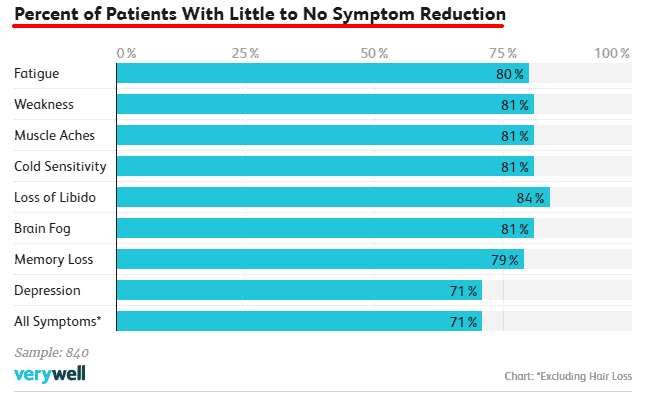
Again, let me reiterate the important point that the goal your doctor sets off with is to completely treat the disease and diminish or reduce the symptoms you are feeling associated with that disease.
If you come in with hypothyroidism and you are experiencing fatigue, cold intolerance, depression, brain fog, and so on, you should expect those symptoms to resolve (if not completely then at least dramatically) once you start taking thyroid medication.
If that doesn’t happen then you have a serious problem that needs to be addressed.
Even in the face of this information and the complaints of patients, doctors are reluctant to believe that the treatment for hypothyroidism may be insufficient (highlighted by studies such as these (2)).
Furthermore, we can see that patients are not complaining of these symptoms and then keeping them to themselves.
We see that these patients are discussing these symptoms with their doctor at almost every visit:
- 90% of patients discuss their fatigue at every visit
- 78% of patients discuss their weakness at every visit
- 79% of patients discuss their muscle aches at every visit
- 76% of patients discuss their dry skin at every visit
- 72% of patients discuss their sensitivity to cold at every visit
- 73% of patients discuss their brain fog at every visit
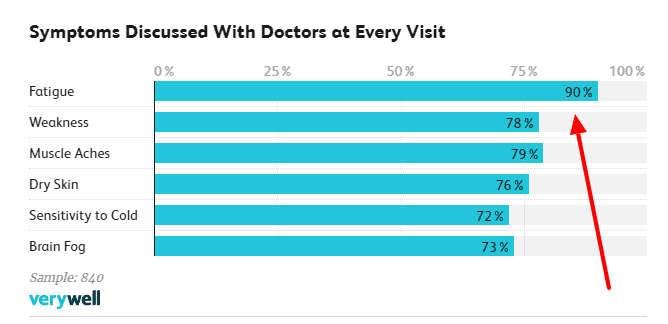
I’ve explained in detail how these persistent symptoms can easily be linked back to hypothyroidism and low thyroid function in several of my articles in the past.
If you want to read up on those please see the links above to the symptoms described.
The main point here is that we must reconcile the fact that most patients who are being treated for hypothyroidism remain extremely symptomatic.
Once we face that fact we can try to explain it away in several ways (I’m playing devil’s advocate here):
#1. There is some other problem causing these symptoms.
It could be that there is some overlap between hypothyroid symptoms and other conditions which can cause similar conditions.
This logic is exactly why so many patients end up on anti-depressants or end up in counseling/therapy.
I do believe that there are certainly other conditions that can cause fatigue, weight gain, dry skin, and so on but it’s hard to believe that 80% of thyroid patients are suffering from these conditions in addition to hypothyroidism.
Much more likely is that their original disease was not treated appropriately.
#2. The patients haven’t been receiving treatment long enough to experience an improvement.
You could also argue that these symptoms might resolve if given enough time for treatment.
While it does take up to 6-8 weeks for patients to start feeling better on thyroid medication and it can take several months to dial in your dose, it shouldn’t take more than 10 years to get this right.

So, I don’t think you can explain away these symptoms with time.
#3. The patients are not telling the truth.
It would be hard to believe that 70-80% of patients would be lying about their symptoms, but I suppose this could be a potential answer.
There are some people who malinger in order to get certain medications but this seems like a far fetched theory.
#4. The treatment these patients are receiving is not appropriate.
You could argue that the doctors treating these patients are not using the correct therapies.
In other words, even though they are using the right treatment paradigm they are failing to execute that paradigm appropriately.
I don’t believe this to be the case because it’s honestly quite easy to give someone thyroid medication and drop their TSH.
The current treatment paradigm is very easy to follow and very formulaic.
#5. These patients are not being compliant with their medication.
It’s possible, and indeed it does happen, that even though patients are on the right medication and dose, that they are not actually being compliant with their medication.
For instance:
Perhaps you were given a medication to take daily but you only remember to take it a few days per week.
Again, I feel that this is probably not likely given the fact that most people WANT to feel better and don’t want to experience the extreme quality of life symptoms that hypothyroidism causes.
#6. Or (what I believe to be correct) lastly, the current hypothyroid treatment paradigm is inappropriately simplified and not helpful.
Lastly, and this is what I believe is true here, is it’s possible (indeed probable) that our current understanding and treatment paradigm for treating hypothyroidism is just plain wrong.
I suspect this because I’ve been able to help hundreds of people who have failed this current treatment paradigm feel more like their old selves.
You can read more about these case studies and approach here.
Problems with T4 Only Thyroid Medication
Any very important point worth talking about is the section of this survey that highlights the treatments that patients pursue to treat their thyroid disease.
As a thyroid patient, you might see this survey and feel hopeless but that is only the case if you think that your only treatment option available is T4-only thyroid medication.
Let’s look at the survey results to break it down further:
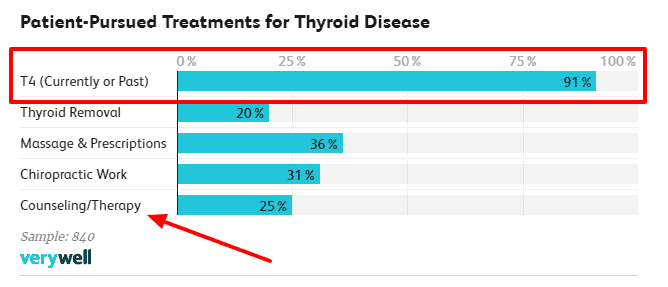
You can see from this image that approximately 91% of thyroid patients who took this survey are taking T4 only thyroid medication.
Medications which fit into this class include levothyroxine, Synthroid, Tirosint, and Levoxyl.
Medications NOT included in this class, and not asked about, include other thyroid medications such as T4/T3 combinations, T3 only thyroid medications, and NDT.
In my opinion, and based on clinical outcomes from several other studies (3), patients tend to prefer these T4/T3 combination medications as they experience an improvement in symptoms (4) when switching from T4 to these medications.
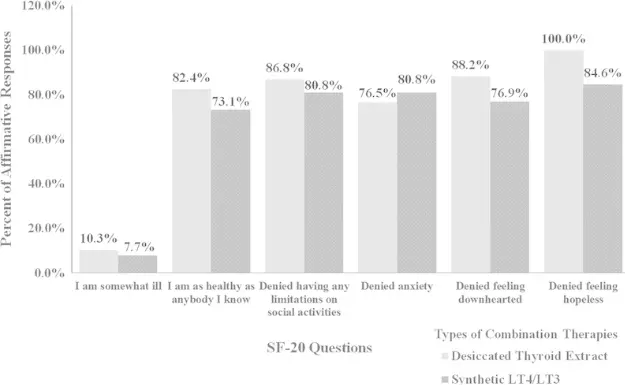
Much of this probably has to do with the fact that your thyroid produces a natural amount of T4 and T3 in its healthy state.
But, suddenly, when you start replacing lost thyroid hormone with thyroid medication, you are only replacing that lost T4 and no effort or consideration is given to the lost T3.
For the record, your thyroid produces approximately 80% T4 and 20% T3 (5).
We also see that some people pursue thyroid removal as a “therapy” and I’m not sure I agree with this statement.
Thyroidectomy, or thyroid removal, is a therapy to treat hyperthyroidism and thyroid cancer but once you have your thyroid removed you are considered hypothyroid for all intents and purposes.
Expanding further on the list of therapies includes those people who try massage, chiropractic work, and counseling/therapy.
Massage may help alleviate some of the symptoms CAUSED by hypothyroidism (including muscle aches and pains) but it will NOT fix the main problem which is the undertreatment of the thyroid.
Chiropractic work, while it can be helpful as well, again will not reverse that issue.
And counseling and therapy may help you deal with your symptoms, but they will not reverse them.
So what we see here is that both patients and physicians are not even focusing on the right aspects of thyroid management.
Instead of focusing on whether or not thyroid hormone is actually being utilized by your cells, whether or not your body is able to convert thyroid hormone to its active form, whether or not you are absorbing your thyroid hormone medication, or whether or not you are dealing with other hormones imbalances, the focus is placed solely on your TSH and T4 only thyroid medication.
And this IS the big problem.
Getting Thyroid Information
I think one of the most concerning aspects of this discussion has to center on how patients are getting their information.
It makes perfect sense for patients to seek out a second opinion or alternative information if they are not getting anywhere with their current doctor.
And it makes further sense to try and find that information online.
There’s only one problem with this…
And that’s the source of information that most thyroid patients are going to.
According to this survey, 43% of patients are seeking information from WebMD, 42% are seeking information from Verywell health (probably biased since they gave out the survey), and 40% are going to the Mayo Clinic.
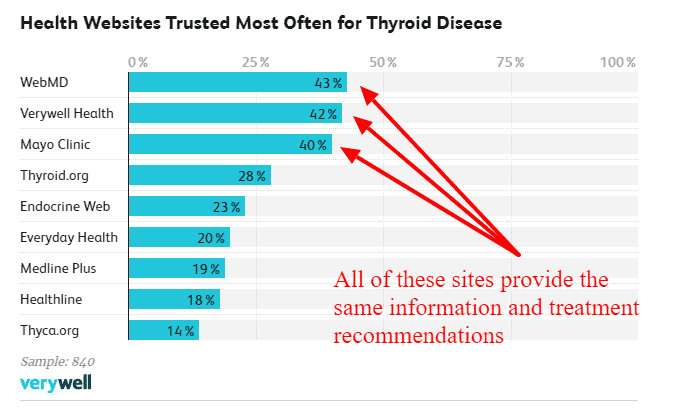
The other websites represent a smaller percentage but are still relevant to this discussion.
I’m not criticizing the information found on any of these websites but you must understand that the information you find on these websites will be the EXACT same information that your doctor is providing you with (that includes both your endocrinologist and primary care provider).
This means that you go to another source seeking advanced information and further help but this source is providing the exact same information.
None of these websites offer information outside of what is considered the ‘conventional’ or ‘standard’ approach.
All of these websites MUST provide information on the current standard of care (otherwise they risk jeopardizing their reputation).
This is both good and bad.
Good in the sense that you will see consistency among providers in terms of how to treat.
But bad in the sense that this rigid philosophy doesn’t allow for variation in treatment!
It’s especially bad if the current treatment turns out to not work very well because this means that with the consistency mentioned above, providers will be consistently wrong in their management.
It gets even worse when you know that standard medicine is at least 15-17 years behind the current literature (6).
When you go to websites such as those listed above you are only hearing the same information over and over again, and if it didn’t help the first time it’s unlikely to help the second or third time you read it.
Instead of going to those sources, you may want to consider other sources, such as this one.
The downside to reading websites such as mine, which focus on newer studies and newer management to old conditions, is that some of the therapies might be proven at a later time to be less effective (I certainly don’t claim to be perfect and not all of my therapies end up working out well).
But the upside and this upside is huge, is that you can take advantage of therapies that are at least 15-17 years ahead of the curve!
How would you like to wait 15-17 years before you start feeling better? This proposition is unsettling.
I understand you may be hesitant to trust a website such as mine about your health, but how on earth does it make sense to keep getting the same information and advice from doctors who treat you the exact same way?
If you are someone who has been treated for over 10 years and you are STILL not feeling better then it might be time to consider a different approach.
I know that it can be difficult to find sources to trust and this is exactly why I provide links to scientific studies which support any of the claims you see on my website.
I suggest you do your own research, learn to understand some of the basics, and try to make your own informed decision about your health.
After all, life is too short to spend 10+ years experiencing symptoms such as fatigue, weight gain, cold intolerance, low libido, and so on.
Takeaways & Conclusion
In my opinion, this survey outlines pretty much exactly what I see among thyroid patients.
My hope is that as this information becomes more disseminated and available that doctors will be forced to take a hard look at how they evaluate their thyroid patients.
As this happens, hopefully, they will look to sources such as this which provide a fresh look at this disease that is crippling millions of people around the world.
If you are someone who is suffering from this disease or these symptoms then be sure you are proactive about your health.
Learn, read, and research as much as you can so you can be an advocate for yourself. I have plenty of free resources designed to help you do just that.
Now I want to hear from you:
Are you a thyroid patient who is also struggling?
Are you one of the lucky few 6% of people who do well on their current treatment?
Or are you one of the ~80% of people who still remains symptomatic despite treatment?
Leave your questions or comments below so we can keep the discussion going!
Scientific References
#1. https://www.verywellhealth.com/survey-finds-doctors-are-failing-thyroid-disease-patients-4583130
#2. https://www.ncbi.nlm.nih.gov/pmc/articles/PMC5321289/
#3. https://www.ncbi.nlm.nih.gov/pmc/articles/PMC3680960/
#4. https://www.ncbi.nlm.nih.gov/pmc/articles/PMC5965938/
#5. https://www.ncbi.nlm.nih.gov/books/NBK519566/
#6. https://www.ncbi.nlm.nih.gov/pmc/articles/PMC3241518/
